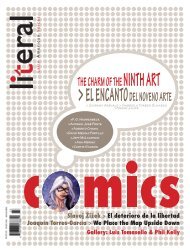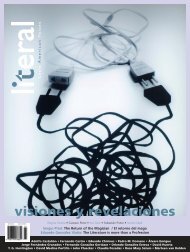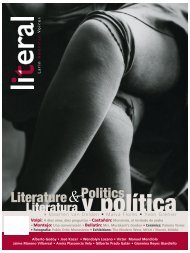Richard Serra - Literal
Richard Serra - Literal
Richard Serra - Literal
You also want an ePaper? Increase the reach of your titles
YUMPU automatically turns print PDFs into web optimized ePapers that Google loves.
theory of social and economic organization, which<br />
advocates that the state, representing the community,<br />
should own and regulate the means of production, distribution<br />
and exchange in order to redistribute evenly<br />
the nation’s wealth. Don’t get me wrong, I do not condemn<br />
social programs, it’s socialism and its ideological<br />
use I despise.<br />
Justice, equality and progress are not synonyms;<br />
yet they appear to be the same only in the Latin leftist<br />
jargon because these words are appeal to the masses.<br />
They are vacant ideals that build up to socialism, a diagnosis<br />
of the past and a vision of the future. But in<br />
this region where the past is collapsed into the present,<br />
ideologies like these are dangerous, because they don’t<br />
offer real solutions. Socialism is the endless repetition<br />
of dreams of development.<br />
The 21st century socialism invokes welfare but fails<br />
to achieve development. In fact, the outcome of this<br />
new socialism has caused the slow dissolution of the<br />
country’s middle class. About 21.1 million Venezuelans<br />
(81 percent of the population) survive with 60 dollars a<br />
month. Social programs help them to stay alive, but fail<br />
to provide them with a dignifi ed live. Claiming they are<br />
social justice, the Venezuelan state oil company spends<br />
a third of its earnings (more than 3.7 billion dollars) on<br />
social programs, which is laudable because no other<br />
government has done so before, but these oil-fueled<br />
social campaigns are band-aids to the country’s main<br />
problems: violence, unemployment and poor education.<br />
Any given week, newspapers present an account<br />
of about 32 gun-deaths in this country; two years ago<br />
the United Nations reported that about 47 people of<br />
every thousand are killed yearly with small arms. In addition,<br />
about half of Venezuela’s workforce operates<br />
in the informal economy, as buhoneros, or street vendors,<br />
who are not counted in the 14 percent of unemployment<br />
fi gures. In other words, about 60 percent of<br />
the population is either underemployed or have no job.<br />
So far, the trickiest problem is education: the National<br />
Institute of Statistics reports that 95.1 percent of Venezuelans<br />
are literate (thus, they can read and write),<br />
but high school dropouts are counted in millions. In<br />
sum, Venezuelans can read, but have no tools to interpret<br />
what they read. Meanwhile, those who want<br />
the benefi ts of the government’s social programs have<br />
to declare their loyalty to Chávez’s party. By promoting<br />
social justice and equality Chávez and his followers<br />
have restricted the freedom and responsibilities of the<br />
country’s poorest classes, claiming their supposed best<br />
interest. Venezuela’s State paternalism has made beggars<br />
of its citizens.<br />
The country’s capital, Caracas, feels like the Macondo<br />
of the banana plantation years, because it has<br />
been divided in two: the rich and the poor. Like American<br />
settlers inhabiting the fi ctional town protected by<br />
electric barriers, upper class Venezuelans live in neighborhoods<br />
with fenced houses. In downtown Caracas,<br />
orphan children live and work in the streets where<br />
buhoneros sell phone calls, food and even sex, and<br />
where violence is rampant.<br />
Venezuela hasn’t achieved social equality but social<br />
division. And the only group making profi t from this<br />
dichotomy between classes is the ruling political party.<br />
Chávez calls the 21 st century socialism the revolution<br />
of the poor, but the only true revolution in Venezuela<br />
has been oil. Venezuela, like Macondo, is a country politically<br />
unstable; dependent on oil exports and ruled by<br />
a small leftist group… it’s a Banana Republic. But these<br />
riches have an expiration date. What will become of<br />
Venezuela after a rainy day, or four years of rainy days,<br />
like in Macondo? Let’s only hope that ideologies have<br />
an answer for that, because otherwise, like García<br />
Márquez’s fi ctional town, Venezuela could be wiped<br />
from the map by a giant windstorm.<br />
OTOÑO, 2007 • LITERAL. VOCES LATINOAMERICANAS 3 49






